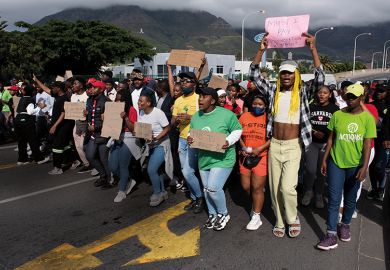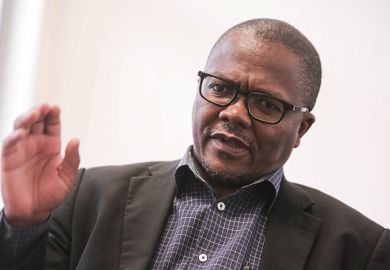South Africa’s governing African National Congress (ANC) is limping towards next month’s general election with its lowest share of the vote for decades, and its beleaguered higher education minister appears to be symptomatic of that.
Blade Nzimande, who has served in the role almost continuously since former president Jacob Zuma’s landslide election victory in 2009, has faced repeated calls to resign over his management of the National Student Financial Aid Scheme (NSFAS).
The chair of the South African Communist Party, which is part of an ANC-led political alliance, was briefly removed as minister after a falling out with Mr Zuma in 2017, and it’s the former president who is causing trouble for the ANC now.
With elections scheduled for 29 May, polls suggest president Cyril Ramaphosa’s party will lose the parliamentary majority it has maintained since it took power under Nelson Mandela in 1994, with Mr Zuma’s new party, uMkhonto weSizwe (MK), looking to steal some of its votes.
Much like his political opponent Mr Zuma, Dr Nzimande has faced allegations of corruption, including claims that he took kickbacks from the NSFAS, a bursary for students from poor and working-class families, which he denies.
Dr Nzimande dissolved the board of NSFAS in April and placed it into administration because of growing concerns around the recurring problem of non-payment of student allowances. The decision was welcomed as “long overdue” by the South African Union of Students, but prompted further outcry.
Organisation Undoing Tax Abuse (Outa), a civil society body, called for his resignation, as did several political parties, including the Democratic Alliance (DA), which criticised the “shocking mess that the NSFAS is in and [was] adamant that heads must roll”.
Chantel King, the DA shadow minister of higher education, said the allegations had “shaken the foundations of trust in the administration of student financial aid once again”.
“Minister Nzimande cannot be absolved from actions of the board since he has defended the decisions of the board on numerous occasions,” she added.
Nico Cloete, the former director of the Centre for Higher Education Trust and coordinator of the Higher Education Research and Advocacy Network in Africa said that “both the minister and the board must go”. “The minister is part of the problem,” he told Times Higher Education.
However, Mr Nzimande has so far refused calls to resign, telling local journalists that his detractors were just “playing politics”.
“I have consistently raised my concerns with the outgoing NSFAS board about the inability and failure of NSFAS to carry out and implement some of its most basic responsibilities,” he said, according to reports.
Since then, he has turned the attention of his department towards bogus honorary degrees – something he has done throughout his time as minister.
A series of high-profile celebrities have recently been awarded doctorates from Trinity International Bible University in recent weeks.
However, Dr Nzimande has made a number of statements highlighting that the institution is not registered, and is therefore not authorised to offer any qualifications, including honorary degrees.
Register to continue
Why register?
- Registration is free and only takes a moment
- Once registered, you can read 3 articles a month
- Sign up for our newsletter
Subscribe
Or subscribe for unlimited access to:
- Unlimited access to news, views, insights & reviews
- Digital editions
- Digital access to THE’s university and college rankings analysis
Already registered or a current subscriber?








